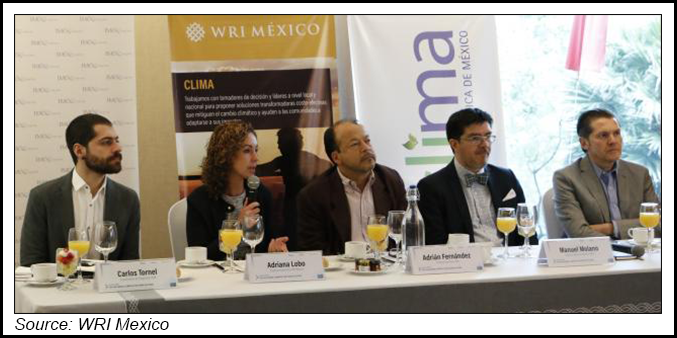Regulatory | NGI All News Access
Mexico Civil Society Groups Call on Next Administration to Extend CO2 Tax to Natural Gas
Three civil society groups have urged the next Mexican government to strengthen and expand the country’s carbon dioxide (CO2) tax to include natural gas.

The Mexico chapter of the World Resources Institute (WRI), local think-tank Instituto Mexicano para la Competitividad (IMCO) and the Iniciativa Climatica de Mexico (ICM) held a joint press conference on Monday to discuss their recommendations on climate change and energy policies for the next administration, which would take office in December after elections scheduled for July 1.
Those recommendations included increasing Mexico’s carbon tax and incorporating the costs of emissions from burning natural gas, which is exempt under the current fiscal regime.
Mexico is one of the few Latin American countries to have implemented a penalty on CO2 emissions, albeit a relatively weak one.
Enacted in 2014 by the administration of current President Enrique Peña Nieto, the emissions tariff applies to producers and importers of fossil fuels — namely, gasoline, diesel, liquefied petroleum gas and oil fuel.
However, the tax, which currently averages around 70 pesos ($3.71) per ton of CO2 emitted, “has not managed to change society’s behavior” in terms of fuel consumption, according to the three organizations.
The tariff is calculated based on the CO2 content of each fuel, but includes exemptions for natural gas, as well as jet fuel and oil used in petrochemical processes.
The Peña Nieto administration added the natural gas and jet fuel exemptions to the tax at the urging of the private sector. Natural gas is also a key to Mexican government’s energy policies, especially for the electricity market.
Mexico is in the midst of substituting oil fuel and diesel for natural gas at existing power plants. The Energy Ministry (Sener) also expects the power grid to add nearly 19GW of combined-cycle generation over the next 15 years.
According to the official Sener forecast, natural gas demand in the electricity sector would increase 50% to reach almost 6 Bcf/d by 2031, accounting for 82% of all fuel consumed by Mexican power plants.
“What was originally seen as a transitional measure toward less polluting electricity sources is now becoming the principal source of emissions in the Mexican energy matrix,” ICM program coordinator Carlos Tornel said.
The expansion of natural gas is also worrying, given Mexico’s increasing dependence on U.S. gas imports, he added. To meet the new power sector demand for gas, state-run electricity company Comision Federal de Electricidad (CFE) is sponsoring a massive buildout of the Mexican pipeline network, connecting new areas of the country with basins in the United States.
At the press conference, the three organizations also called for the next president to phase out subsidies in the energy sector, and criticized efforts by current administration to liberalize fuel prices in Mexico.
“While it’s true that the [fuel] subsidy benefited households that least required it, removing it without implementing an adequate compensation program for those who did need the subsidy has had a disproportionate impact on the poorest households,” IMCO deputy director Manual Molano said.
It is unclear whether these recommendations will find receptive ears in the next Mexican administration. Fuel prices are a politically sensitive issue. The current leader in the polls, the left-leaning populist Andres Manuel Lopez Obrador, has said he would freeze fuel and electricity prices for three years if elected.
As the end of 2016, as part of the energy reforms, the Peña Nieto administration announced an up to 20% hike in gasoline prices that led to widespread social protests against what came to be known as the “gasolinazo.”
Lopez Obrador, a vocal critic of the reforms, has said there would be no more gasolinazos in Mexico if he wins in July. He leads his nearest opponent by about 20 points in most recent polls.
© 2024 Natural Gas Intelligence. All rights reserved.
ISSN © 2577-9877 | ISSN © 2577-9966 |
